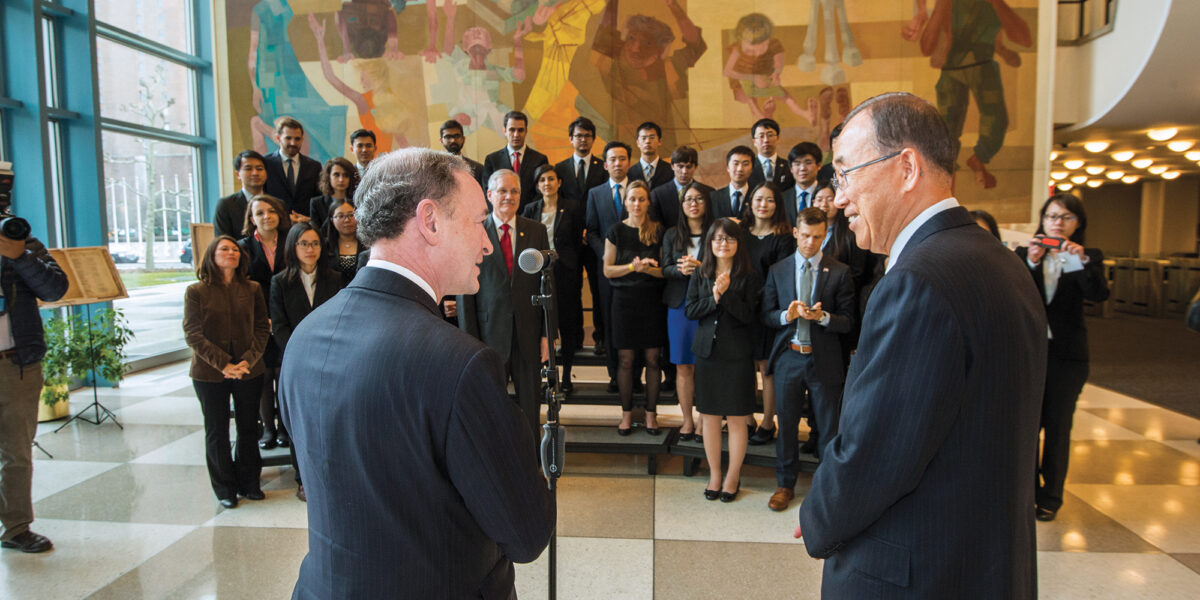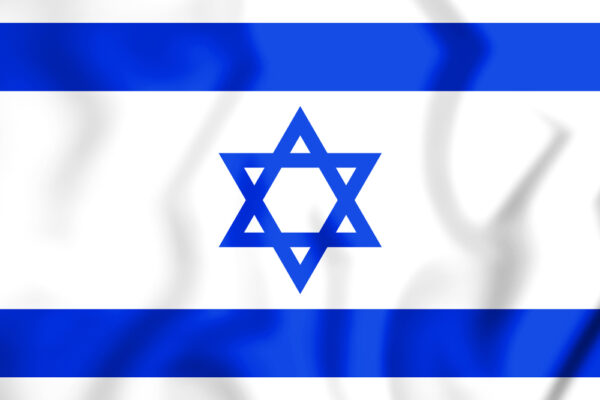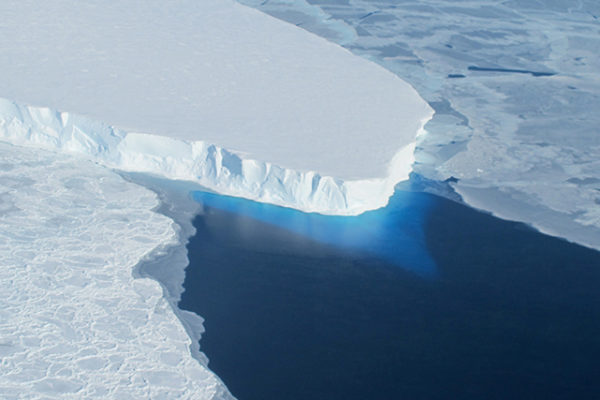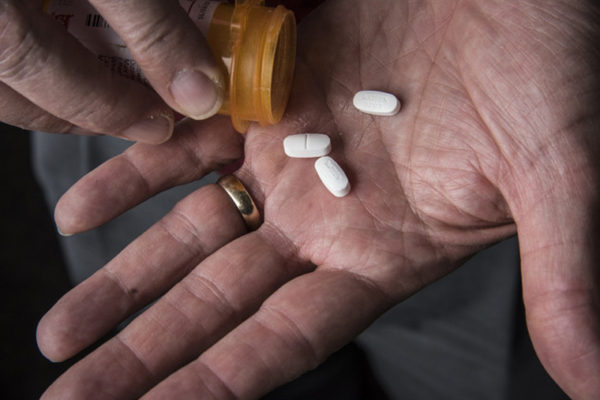In 1995, when Chancellor Mark S. Wrighton gave his inaugural address as the 14th chancellor of Washington University, one of his key themes was making the university a global leader.
“Washington University will remain among the leading educational institutions only if we are preparing our students to live and work in an increasingly internationalized world,” he said. He had a vision of developing “strategic relationships with institutions in other countries,” particularly in Asia, and he emphasized the importance of bringing the world to Washington University by attracting the best international students and scholars.
Ten years later in 2005, Chancellor Wrighton, along with former Sen. John C. Danforth and Life Trustee John F. McDonnell, DSc ’06, MBA ’14, former chairman of the board of McDonnell Douglas Corp., were together in the Overseas Press Club in New York City to announce the university’s new global initiative, the McDonnell International Scholars Academy.
The academy would build partnerships with leading international universities, and through these, Washington University would attract top-flight international scholars to a program designed to make them world leaders. The partnerships would also broaden the scope, reach and collaborative potential of the university’s research.
“This initiative … is one of the most farsighted undertakings I have seen,” John F. McDonnell said at the announcement. “It integrates the internationalization of research and education with the ascent of Washington University among the world’s leading universities.”
“Most academic connections are developed along the lines of narrowly defined intellectual interests,” said James V. Wertsch, the David R. Francis Distinguished Professor, who served as founding director of the McDonnell International Scholars Academy and as vice chancellor for international relations before stepping down in 2018. “In contrast, the McDonnell Academy brings together a ready-made network of universities and top minds from many areas to talk about world problems. Just as technology has become globalized, so have our challenges.”
When it started, the academy had 15 partner universities all in Asia. Now it boasts 34 partner institutions around the globe.
In May 2007, the McDonnell International Scholars Academy held its first international symposium, which gathered leading scholars from partner institutions to discuss issues regarding energy and the environment. The academy continues to host symposia biennially, and it has broadened the number of topics discussed over time. At the most recent symposium in Beijing in 2018, topics included population aging, air pollution, energy, the environment, agriculture and climate change. Developing more sustainable campuses was also a key topic. While there, 21 member institutions signed the University Campus Sustainability Declaration, pledging to reduce their carbon footprints.
The world has come to Washington University as well. When Wrighton made his inaugural address, the student body represented 45 nations. Today, that number has more than doubled, and international students represent 19 percent of the university’s enrollment.
Looking to the future, Washington University is committed to deepening its engagement in Africa. To lead this endeavor, the university hired Benjamin Ola Akande as senior adviser to the chancellor and director of a new Africa initiative.
“The vexing problems and challenges we face are ones that are multidisciplinary in character,” Wrighton said in his first address, “requiring concerted, synergistic effort from many intellectual perspectives. Some areas of contribution will involve improving human health, sustaining the environment, developing economic strength, fostering world peace and enhancing the quality of life. No important problem is too complex or too difficult to tackle … Our work awaits us. Let us begin.”
His commitment inspired faculty and researchers across Washington University to think and act more globally, reshaping the way people live around the world. Below are just a few of the university’s many global projects. To see more go to global.wustl.edu. To see the projects on a map go to GlobalMap
North America & the Caribbean
Helping moms and children
Lora Iannotti, associate professor and associate dean for public health, and Patricia Kohl, associate professor and associate dean for social work, teamed up in Haiti to create a parenting intervention program. It offered families eggs for 12 weeks and brought moms together to discuss sanitation, hygiene and the importance of animal-sourced foods for kids. “What we’re learning in Haiti is applicable to impoverished communities in the U.S.,” Kohl says.
Understanding animals
Jonathan Losos, the William H. Danforth Distinguished University Professor, has traveled the world studying animals and biodiversity, with a focus on Caribbean Anolis lizards. He is also the founding director of the Living Earth Collaborative, a center for biodiversity. A collaboration involving Washington University, the Missouri Botanical Garden and the Saint Louis Zoo, the Living Earth Collaborative will have field projects all over the world to study and save the plants and animals that sustain life on Earth.
Central & South America
Battling cancer
As the Larry J. Shapiro Director of Washington University’s Institute for Public Health, William G. Powderly, MD, the Dr. J. William Campbell Professor of Medicine and co-director of the Division of Infectious Diseases at the School of Medicine, has made a huge impact on medicine around the world, particularly in the field of HIV/AIDS, where he has been conducting research for 30 years. Recently, Powderly began a new initiative funded by USAID to install radiotherapy equipment in Guatemala that will help diagnose and treat cancer patients.
Understanding ancient climates
Bronwen Konecky, assistant professor of earth and planetary sciences, and Sarah Baitzel, assistant professor of archaeology, both in Arts & Sciences, are studying climatic and environmental change in the high Andes Mountains as a backdrop to pre-Hispanic human activities. Their reconstruction of past climate and cultural shifts at a newly discovered archaeological site at Lake Sibinacocha, Peru, is supported by the National Geographic Society and Washington University’s International Center for Energy, Environment and Sustainability (InCEES).
Africa
Developing new diagnostics
Testing blood for malaria can be expensive and challenging in developing countries. Audrey Odom John, MD, associate professor of pediatrics and director of the pediatric infectious diseases fellowship program, is developing a breath test for malaria, by collecting breath samples from children in Malawi.
Battling childhood malnutrition
In 2001, world-renowned doctor and researcher Mark J. Manary, MD, the Helene B. Roberson Professor of Pediatrics, was in Malawi field-testing a nutrient-rich, peanut butter–based food that restored malnourished children to health. Since 2004, his Project Peanut Butter has treated more than one million malnourished children in Africa.
Improving women’s reproductive health and girls’ access to education
Throughout his career, L. Lewis Wall, MD, the Selina Okin Kim Conner Professor in Arts & Sciences and professor of obstetrics and gynecology at the School of Medicine, has worked in Africa to improve the health and lives of women. Now, he has started Dignity Period to help girls in Ethiopia get access to menstrual pads and menstruation education. Typically, girls stay home from school during their menstrual periods because they lack proper supplies, a practice that contributes to higher dropout rates.
Europe
Protecting human rights
Leila Sadat, the James Carr Professor of International Criminal Law at the School of Law and director of the Whitney R. Harris World Law Institute, wrote the world’s first global treaty on crimes against humanity, addressing their prevention and punishment. The draft treaty, available in seven languages, is being debated by the UN International Law Commission and governments around the world.
Building connections
In addition to exploring the broad social transformations taking place in the worldwide Muslim community (with field sites across Europe, Asia, the Middle East and Africa), John Bowen, the Dunbar-Van Cleve Professor in Arts & Sciences, is also leading the Trans-Atlantic Forum, a collaboration between Washington University scholars in the social sciences and graduate schools in Paris and Amsterdam.
South Asia
Clearing the air
In India and other energy-impoverished regions, people still use solid fuels (wood, charcoal, crop waste) to cook their food, which can release dense, black smoke into the home. Pratim Biswas, assistant vice chancellor of international programs and the Lucy and Stanley Lopata Professor in the McKelvey School of Engineering, and Rajan Chakrabarty, assistant professor of engineering, went to rural parts of India to study the impact of cook-stove emissions. “Traditional cook-stove burning is one of the largest sources of pollutants in India,” Chakrabarty says. “We found it’s a really big problem, revising what people knew for decades.”
Treating the gut
Jeffrey I. Gordon, MD, the Dr. Robert J. Glaser Distinguished University Professor and the director of the Edison Family Center for Genome Sciences & Systems Biology, has used his groundbreaking studies of the gut microbiome to help malnourished children in developing countries. His research in Bangladesh showed that children suffering from malnutrition possess gut microbial communities that fail to assemble normally. His studies have catalyzed efforts to develop new microbiome foods directed at repairing the problem.
East & Southeast Asia
Advancing global food security
Barbara Schaal, dean of the Faculty of Arts & Sciences and the Mary-Dell Chilton Distinguished Professor, is an internationally renowned evolutionary biologist. Her research has helped make staple food crops such as rice resistant to genetic mutations, able to withstand floods and less vulnerable to insect attacks. A recent study took her to the remote rice farms of Thailand. “It’s fun working on something where everything that you do … contributes to a larger effort to produce more food for the world,” she says.
Helping families save for children
Michael Sherraden, the George Warren Brown Distinguished University Professor and founding director of the Center for Social Development (CSD), studies inclusion and asset building. His policy ideas have led to many countries starting child-development accounts that help families save for their children. Recently, Li-Chen Cheng, PhD ’95, a former student of Sherraden’s, helped develop a child-development–account policy in Taiwan, after working closely with Washington University’s CSD.
Earning high honors
The university currently has three faculty members who have earned the Chinese Ministry of Education’s highest award for an individual in higher education, the Yangtzee River Scholar Award. (An alum as well as another faculty member who earned his Yangtzee River Scholar Award through another school were also honored.) It is rare for a U.S. university to have even one such scholar, let alone three.
Middle East
Helping children through savings
Michal Grinstein-Weiss, the Shanti K. Khinduka Distinguished Professor at the Brown School, helped get a child savings account program for all newborns passed in Israel’s parliament in 2015.
Showing mobile banking works in areas of conflict
Tarek Ghani, assistant professor at Olin Business School, conducted a study in Afghanistan to see if mobile banking could facilitate a default-savings program. The country has seen a proliferation of mobile-phone subscriptions, but it still lacks a financial infrastructure. The study showed that the default-savings program worked and was easily scalable.
Australia
Improving legal education
As director of Washington University’s Criminal Justice Clinic, Peter A. Joy, the Henry Hitchcock Professor of Law and vice dean for academic affairs in the School of Law, supervises student-lawyers who provide direct legal representation to clients. Joy’s expertise in clinical programs led him to co-author the book Australian Clinical Legal Education and recently took him to Monash University and University of Melbourne, both in Melbourne, Australia. He delivered talks on legal ethics, another of his areas of expertise.
Antarctica
Unlocking the universe …
The Earth is constantly being bombarded by cosmic rays, high-energy particles from beyond the solar system. Brian Rauch, research assistant professor of physics in Arts & Sciences, launched SuperTIGER in Antarctica, which could reveal the origin of these rays. This was not SuperTIGER’s first flight; its previous flight, led by Robert Binns, research professor of physics, lasted 55 days.
and the Earth
Due to melting ice, the bedrock in Antarctica is rising at one of the fastest rates ever recorded. Douglas Wiens, the Robert S. Brookings Distinguished Professor in Arts & Sciences, is studying the phenomenon. The findings so far mean that up to 10 percent more ice has disappeared from the region than previously thought.



